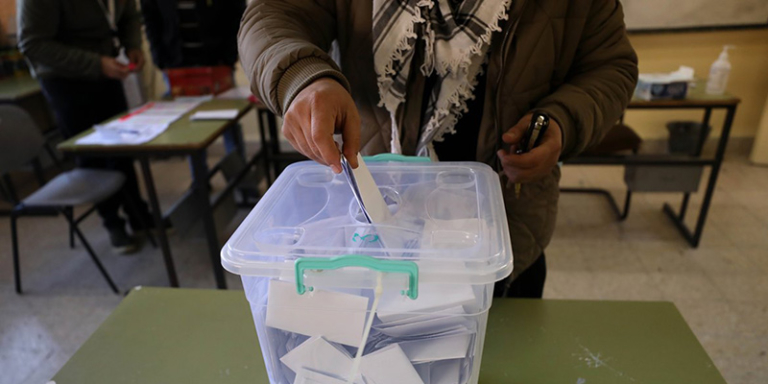
President Mahmoud Abbas issued a decree last January to hold elections for the Palestinian Legislative Council (PLC), the presidency of the Palestinian Authority (PA), and the Palestinian National Council (PNC). The Palestinian Central Elections Commission (CEC) set an electoral agenda to conduct the PLC vote on May 22nd, the presidential poll on July 31st, and the PNC ballot on August 31st. Today the first stage of the electoral process, registration, has ended, with 93 percent of eligible voters joining the rolls. The second phase, that of forming electoral lists, has also concluded with some 36 lists and over 1,400 candidates submitting their names for the PLC’s 136 seats. A third phase, campaigning, will soon begin. The whole process culminates in a popular vote on May 22nd.
This round of elections is very important. Palestinians suffer from limited democracy and internal geographical and political division between Fatah and Hamas. These two conditions are inherently intertwined. Each of these factions is entrenched in its own territory—Fatah in the West Bank and Hamas in the Gaza Strip—where it exercises authority. It is hoped that these elections, which have not been held for 15 years, will revive democracy, lead to proper governance, and end internal division.
Election Mechanics
The PLC and the later presidential elections are to be held under the auspices of the CEC. They are restricted to the 4.5 million Palestinians living in the West Bank (including Jerusalem) and Gaza—namely those living in the areas occupied by Israel in 1967. There are currently over 6 million additional Palestinians living in the diaspora, and they will be represented through another election and/or selection process for members of the PNC. In essence, this election impacts democratization at all levels of Palestinian life.
Elections managed by the CEC have been and will continue to be transparent. The upcoming poll will be monitored by more than 10,000 individuals who are representatives of the political parties and lists, local members of nongovernmental organizations in the West Bank and Gaza, as well as international observers. All these monitoring processes will be under the jurisdiction of the CEC
The electoral process has been tested in at least two previous elections, in 2005 and 2006. Results are processed digitally, and for the small Palestinian population, the results can be tallied within 24 hours. Ballot boxes are opened inside the voting centers under the scrutiny of the parties and monitoring agencies. Once the results of a specific ballot box are finalized, a memorandum is prepared that shows the results of that specific ballot box, and it is signed by the representatives of the various parties. These signed memorandums are then forwarded to the CEC center in Ramallah where the results of all the ballot boxes, for all of the centers, are checked and tallied. The electoral outcomes are known within 24 hours and reported publicly in a meeting attended by representatives of the various political parties.
Obstacles to the Elections
There are three major impediments to the electoral process:
a) Elections in Jerusalem. The PLO and Israel signed an agreement in 1995 on the modality of elections in Jerusalem. This included the campaigning rights of candidates in Jerusalem and the polling rights of Jerusalemites in specified centers in the city. Elections since that time have been conducted under the same protocol: legislative and presidential in 1996, presidential in 2005 (held after the passing of President Yasser Arafat), and legislative in 2006. For the upcoming round, the CEC did not require Jerusalemites to register and allowed them to cast their ballots in post offices or in Jerusalem’s suburbs. The Palestinian Authority has formally addressed Israel to ensure its commitment to implementing the agreed-upon election protocols in Jerusalem. So far, Israel has yet to respond, although campaigning is set to begin on April 30th. Nonetheless, if Israel prohibits the election in the city, the Palestinians should hold them anyway and not let Israel dictate their fate. East Jerusalem is part of the occupied territories and Palestinian sovereignty there cannot be undermined. Holding elections in the city is part of the continued struggle between Israel and the Palestinians for the actualization of the Palestinians’ legal and sovereign rights. On the other hand, if President Abbas cancels the elections, he should push for the formation of a unity government.
b) Local Recognition of the Results. To assure the local acceptance of the results, a Code of Conduct statement was drafted by the parties engaged in the elections to safeguard the acceptance of the election results. In 2006, Mahmoud Abbas accepted the results of the Legislative Council elections (when Fatah lost to Hamas), and a government headed by Hamas was formed. Unfortunately, internal conflict broke out in 2007 and scuttled the election outcome.
c) International Recognition of the Results. This is a difficult matter. Western states and the European Union did not accept Hamas’s win in 2006 and are not likely to do so now. Still, Palestinians do not need an a priori recognition from anybody. The elections should thus move forward despite all possible obstacles.
Some Final Thoughts
It must be affirmed that democracy and military occupation cannot coexist for an extended period; they are contradictory in nature. Palestinians must make use of the political landscape in an attempt to democratize their society while continuing to work on ensuring Palestinian statehood.
It would be a mistake to have democracy simply for its own right; Palestinians must harness it and use it as a stepping-stone toward liberation. The present generation of leaders seems to have failed miserably to both actualize democracy and assure statehood. With the impending climate of democracy, a new generation of Palestinians will be more forthcoming in achieving justice and freedom for Palestine and for the Palestinian people.

